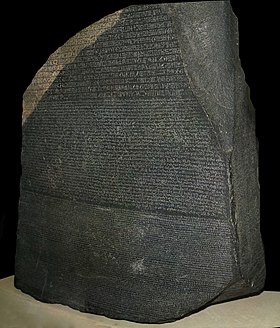Capitulation of Alexandria (1801)
 | |
| Context | End of the French expedition to Egypt |
|---|---|
| Signed | 1801 |
| Location | Alexandria, Egypt |
The Capitulation of Alexandria in August 1801 brought to an end the French expedition to Egypt.
Background
French troops, who had been abandoned by
Text
The text of the Capitulation is printed in full in Robert Wilson's History of the British expedition to Egypt.
Transfer of Egyptian antiquities
Under Article 16 of the capitulation "the Arabian manuscripts, the statues, and the other collections which have been made for the French Republic, shall be considered as public property, and subject to the disposal of the generals of the combined army." This led to the transfer to British possession of the
Spoils
At the Capitulation, the British discovered the French warships Cause,
Notes
- ISBN 978-1-84832-204-2.
References
- ^ Wilson, Robert (1803). History of the British Expedition to Egypt (2nd ed.). London: T. Egerton. pp. 346–353. Retrieved 18 November 2013.
- ^ "No. 15426". The London Gazette. 10 November 1801. p. 1354.
- OCLC 884012387.
External links
 Media related to Capitulation of Alexandria (1801) at Wikimedia Commons
Media related to Capitulation of Alexandria (1801) at Wikimedia Commons
